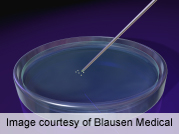- The Best Time of Day to Drink Bone Broth to Maximize Health Benefits
- 8 Ways to Increase Dopamine Naturally
- 7 Best Breads for Maintaining Stable Blood Sugar
- Gelatin vs. Collagen: Which is Best for Skin, Nails, and Joints?
- The Long-Term Effects of Daily Turmeric Supplements on Liver Health
- Could Your Grocery Store Meat Be Causing Recurring UTIs?
- Are You Making This Expensive Thermostat Error This Winter?
- Recognizing the Signs of Hypothyroidism
- 10 Strategies to Overcome Insomnia
- Could Artificial Sweeteners Be Aging the Brain Faster?
Stem Cells Used to Regenerate Heart Muscle in Monkeys


Scientists who used human embryonic stem cells to regenerate damaged heart muscle in monkeys say this technique could be ready for human clinical trials within four years.
If the research proves successful, it could provide a way to restore normal function in failing hearts, according to the researchers.
Before this study, it wasn’t known if it would be “possible to produce sufficient numbers of these cells and successfully use them to remuscularize damaged hearts in a large animal whose heart size and physiology is similar to that of the human heart,” team leader Dr. Charles Murry, professor of pathology and bioengineering at the University of Washington in Seattle, said in a university news release.
Murry and his colleagues triggered heart attacks in anesthetized macaque monkeys and two weeks later injected 1 billion heart muscle cells derived from human embryonic stem cells into the damaged areas of the heart. That amount of cells was 10 times greater than what the researchers had previously been able to create.
The monkeys received immune system-suppressing drugs to prevent rejection of the transplanted human cells. Within a few weeks, the new heart muscle cells matured and began to beat in time with the monkeys’ heart cells. After three months, the transplanted cells appeared to be fully integrated into the monkeys’ heart muscles.
On average, the transplanted cells regenerated 40 percent of the damaged heart muscle, according to the study published online April 30 in the journal Nature.
“The results show we can now produce the number of cells needed for human therapy and get formation of new heart muscle on a scale that is relevant to improving the function of the human heart,” study co-author Dr. Michael Laflamme, also from the University of Washington, said in the news release.
There was at least one area of concern, however. In the weeks following the cell transplants, the monkeys had episodes of irregular heartbeats. But, the irregular heartbeats disappeared within two to three weeks as the stem cells matured, said Murry, who is also the director of the UW Center for Cardiovascular Biology.
The team plans to find ways to reduce the risk of heart rhythm problems and will try to prove that the stem cells strengthen the heart’s pumping power.
Research carried out on animals often fails to produce similar results in humans.
More information
The U.S. National Library of Medicine has more about heart attack.
Source: HealthDay
Copyright © 2026 HealthDay. All rights reserved.










